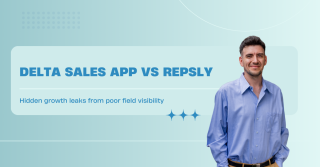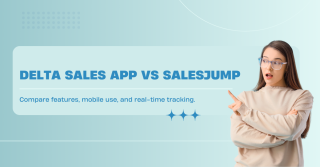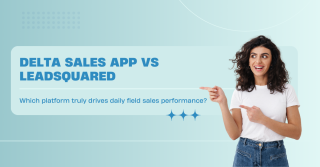The Essential Checklist for Choosing a Liquor Distributor in 2025
_(1)_(21)_1745221023.png)
In the dynamic and competitive world of alcohol branding, choosing the right liquor distributor is more than just a necessary step—it’s a strategic milestone. From emerging craft spirits to ready-to-drink innovations, success today hinges not just on what you produce, but who helps you sell it.
Your distributor is your representative in the field. They're the ones pitching your product to retail decision-makers, managing inventory, placing displays, and keeping your bottles flowing into bars, restaurants, and stores. In 2025, the landscape has evolved beyond basic logistics. Technology now plays a defining role in how well your product moves.
Brands that partner with distributors who embrace field sales automation software gain critical advantages—like improved retail execution, territory insights, and efficient rep activity tracking. Meanwhile, a solid distributor management system ensures orders, inventory, promotions, and payments flow smoothly across the supply chain.
This step-by-step checklist will help you navigate legal complexities, set brand expectations, and choose a distributor that fits your goals and understands your vision.
Step 1: Know the Legal Landscape
Before starting the distributor search, get familiar with the regulatory framework that governs alcohol distribution in your target markets.
Key Legal Considerations:
-
Control vs. Open States:
Some states, called “control states,” manage alcohol sales directly through government-run agencies. In “open” states, private distributors manage sales. Knowing the difference is key to how you’ll structure your go-to-market approach. -
Franchise Laws:
States with franchise protections can lock you into long-term distributor agreements. Understand the legal implications before signing anything. -
Product-Specific Regulations:
Wine, beer, and spirits are often governed by separate sets of laws. Make sure you're compliant based on your exact beverage category.
Step 2: Define Your Distributor Criteria
With legal clarity in place, define what the “right” distributor looks like for your brand. You’re not just looking for reach—you’re looking for alignment, execution, and commitment.
Ask Yourself:
-
Does this distributor specialize in emerging, niche brands—or are they focused solely on established players?
-
Do they have a strong retail sales network and promotional team?
-
How responsive are they with reporting and communication?
-
Can they support creative marketing campaigns and events?
In today’s environment, distributors who equip their teams with field sales automation software often outperform those who rely on manual tracking. These tools allow them to monitor retail visits, store audits, and rep performance in real-time—giving your brand a competitive edge.
Sample Criteria Table
Step 3: Evaluate Their Use of Technology
Today’s best distributors are also the most tech-enabled. Ask how they use software and systems to support your brand’s performance.
Distributors that implement a distributor management system can manage multiple layers of operations more efficiently. These systems are essential for real-time inventory monitoring, order accuracy, promotions tracking, and invoicing.
Meanwhile, sales reps who rely on field sales automation software deliver higher efficiency and stronger visibility into what’s happening in stores. You’ll get data on which accounts are growing, where placements need reinforcement, and what actions reps are taking daily.
Pro Tip: Ask if their tools allow you to access dashboards or reports. When you’re looped into the system, you can make smarter, faster marketing decisions.
Step 4: Start the Discovery Process
Now that you know what you’re looking for, it’s time to identify and reach out to potential partners.
Ways to Find Quality Distributors:
-
Industry Directories:
Use tools from organizations like Wine & Spirits Wholesalers of America or Beverage Trade Network to find reputable contacts. -
Search by State and Product Type:
Target searches like “RTD distributors in particular place” or “premium spirit wholesalers in that state.” -
Tap Your Network:
Other brand owners, bartenders, and liquor store managers are great sources for referrals. -
Explore Their Brand Portfolios:
Does the distributor already represent products similar to yours? If so, that’s a good sign they understand your segment and customers.
Distributors who combine strong relationships with smart systems like a distributor management platform are often more reliable, especially when scaling to multiple markets.
Step 5: Create a Brand Pitch That Converts
Distributors receive countless pitches—so yours has to stand out with clarity, value, and vision.
Key Elements to Include:
-
Brand Story – Highlight your mission, inspiration, and what makes your product different.
-
Pricing Structure – Ensure margins are attractive for both you and the distributor.
-
Retail Demand – Show where your product is already gaining traction or committed placements.
-
Marketing Support – Offer promotional plans, launch events, and media assets.
-
Eye-Catching Packaging – Ensure your product is shelf-ready and stands out visually.
-
Rep Training – Prepare guides or short training sessions to help reps pitch effectively.
If your distributor’s reps are using mobile tools for field sales automation, this training becomes even more impactful. Your brand info will be right at their fingertips during store visits.
Step 6: Set Clear, Measurable Expectations
A well-defined partnership starts with transparency. From the outset, make sure you and your distributor are aligned on goals and responsibilities.
Things to Discuss:
-
Sales and volume targets for each territory
-
Restocking timelines and inventory commitments
-
Sampling events, tastings, or festival activations
-
Co-branded marketing campaigns
-
Performance reporting frequency and access
When your partner uses a reliable distributor management system, these aspects are easier to track and adjust. You'll have better visibility into performance metrics, promotion ROI, and regional activity.
Quick Summary Table: Your Checklist at a Glance
Final Thoughts: Partner Smart, Grow Faster
Choosing the right liquor distributor isn’t just a business decision—it’s a growth strategy. You’re selecting the team that will represent your brand, build relationships with your retailers, and help create a lasting impression in the market.
In this digital era, it’s no longer enough to rely on gut feeling or sales alone. Distributors who utilize field sales automation software ensure their reps are working smarter, not just harder. You get accountability, visibility, and consistency across the board.
Meanwhile, a distributor with a robust distributor management system gives you peace of mind that inventory, orders, and promotions are being handled efficiently behind the scenes.
So take the time to research, interview, and negotiate. Ask the tough questions. Share your vision. And only partner with distributors who are fully equipped—and fully committed—to bringing your brand to life.
Because in 2025, the brands that win are the ones backed by partners who hustle with precision, powered by the right tools.
Frequently Asked Questions (FAQs)
Q: What is field sales automation software, and how does it help?
A: It’s a tool used by sales reps to manage their daily retail activities, track store visits, record product placements, and report issues. It gives brands real-time insights into what’s happening at the store level.
Q: How does a distributor management system benefit my business?
A: It centralizes inventory, order fulfillment, invoicing, and promotional tracking, making distribution more efficient and reliable.
Q: Should I start with a local or national distributor?
A: Start local to build brand traction and relationships. Scale nationally when your supply chain and marketing are ready to support that growth.
Q: Can I switch distributors later?
A: It depends on your contract and state laws. Some states have franchise protections that limit changes. Always get legal advice before committing.









